Part III Measures for Each Priority Issue
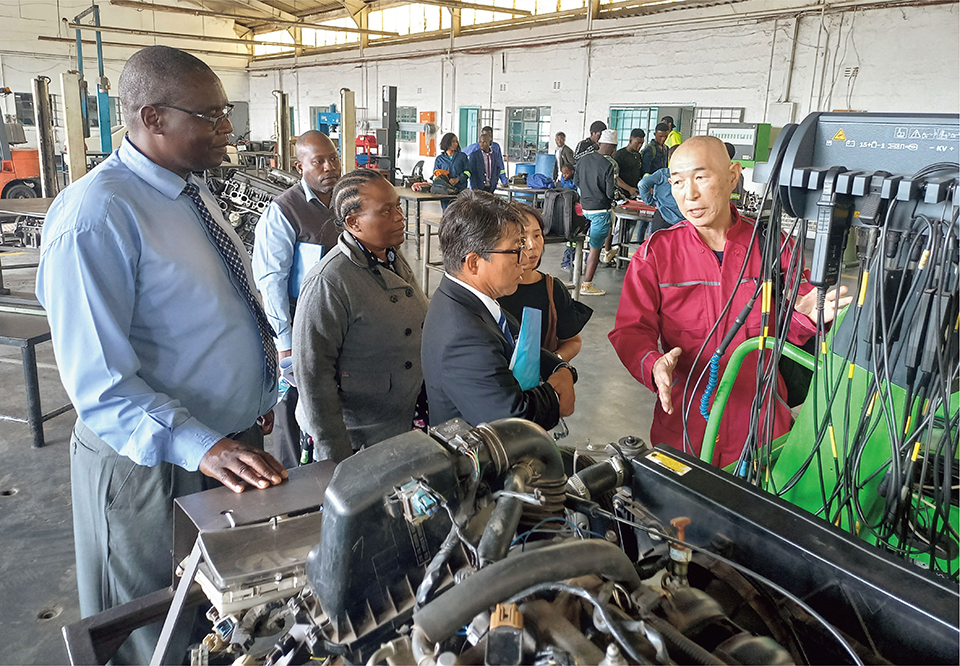
A Japan Overseas Cooperation Volunteer (JOCV) conducting technical cooperation in Zambia identifying fault locations with a vehicle diagnostic device and explaining maintenance methods (Photo: JICA)
1 “Quality Growth” in the New Era and Poverty Eradication through such Growth
(1) Strengthening Socio-Economic Autonomy and Resilience
Japan has sought to eradicate poverty, the most fundamental development challenge, by achieving economic growth and ensuring that it is “quality growth.”Glossary In order to achieve “quality growth,” it is important to improve the socio-economic infrastructure that serves as the foundation for development. Moreover, it is crucial that the private sector plays a key role, and it is indispensable to boost private sector activities, such as the development of industries and the expansion of trade and investment. However, as the global economy faces soaring energy and food prices and disruptions to supply chains, impacted by COVID-19 and Russia’s aggression against Ukraine,Note 1 it can sometimes be difficult to develop capacities or set in place an environment for promoting trade and attracting private investment, particularly in developing countries. Thus, support from the international community is required to strengthen the socio-economic autonomy and resilience of developing countries.
● Japan’s Efforts
■Enhancing Resilience and Diversification of Supply Chains and Economic Diversification
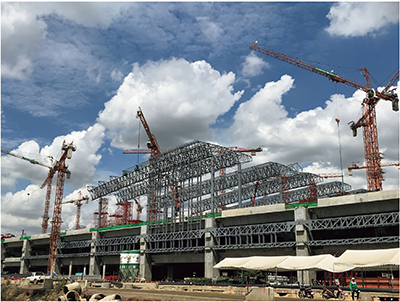
Bang Sue (currently Krung Thep Aphiwat) station, where a roof is being constructed under the “Mass Transit System Project in Bangkok (Red Line) (III)” in Thailand (Photo: JICA)
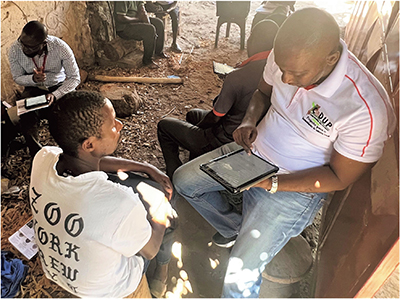
Assisting the applicants of the SME support program in Mozambique under the One Village, One Product Campaign (Photo: JICA)
Japan provides cooperation to develop the trade and investment environment and economic infrastructure of developing countries on both structural and non-structural aspects in order to enhance their export capabilities and competitiveness. On structural aspects, Japan provides cooperation such as the development of transportation networks, including ports, roads, and bridges, which are important for developing countries to engage in trade, and the development of industrial infrastructure, including power plants and power grids. Japan also provides assistance on non-structural aspects including technical cooperation in trade-related areas, such as providing training to customs officials and intellectual property rights experts, to facilitate administrative procedures related to trade control and customs.
Strengthening the economic resilience and economic security of developing countries through such cooperation is an urgent issue in securing a virtuous cycle of growth that ensures quality growth of developing countries as well as the benefits for the Japanese economy. With this perspective in mind, at the G7 Hiroshima Summit in May 2023, Japan led discussions on strengthening economic resilience and economic security, including enhancing resilience of supply chain and critical infrastructure. Based on the discussions, the G7 leaders confirmed that they would closely coordinate in a holistic manner through the G7 framework, and as a comprehensive and concrete message on this agenda, issued the “G7 Leaders’ Statement on Economic Resilience and Economic Security.” In the Statement, the G7 leaders reaffirmed their strong will to “support particularly developing countries in building their resilience.” In addition, the G7 leaders announced the “G7 Clean Energy Economy Action Plan” regarding enhancing the resilience of the supply chain of critical minerals that is necessary for clean energy transition and renewable energy devices manufacturing, and concurred to “seek to deepen their cooperation with and support for partners around the world.”
As an example of infrastructure support contributing to enhancing supply chain resilience, port development and access toll road construction have been underway since 2018 at Patimban Port in West Java Province in Indonesia, under the cooperation of Japanese companies utilizing yen loans and technical cooperation. In December 2021, a local company invested in by a Japanese company began the full operation of an automobile terminal, and in April 2022, port expansion construction commenced and the construction of an access toll road also began. In this way, cooperation between the public and private sector has advanced to improve logistics and other matters (see “Featured Project” for Japan’s infrastructure assistance in India, and Part III, Section 1 (3) for Japan’s infrastructure assistance in other countries).
Japan conducts training for supply chain resilience, development of the sustainable and reliable logistics systems, and strengthening food value chainsNote 2 in Cambodia, Indonesia, Laos, the Philippines, Thailand, and Viet Nam, and a total of 246 government officials and others participated in the training in FY2022. In Indonesia, since 2022, on six remote islands near the border, Japan has been providing technical cooperation to develop high-value-added marine products and off-island distribution to revitalize the economies of the remote islands, in addition to developing fishing facilities.
With regard to the assistance to promote trade with developing counties, Japan has implemented the Generalized System of Preferences (GSP), which applies lower tariff rates than the most-favored nation applied tariff rates to promote imports of developing countries into Japanese markets. Furthermore, for the Least Developed Countries (LDCs),Glossary Japan applies duty-free, quota-free accessGlossary by introducing a special preferential treatment. Moreover, Japan actively promotes Economic Partnership Agreements (EPAs)Glossary and investment agreements. It is expected that these agreements will promote the facilitation of the business environment through trade and investment liberalization (reduction and elimination of tariffs and barriers to trade in services, etc.) and the protection of companies investing overseas and their investment, thereby encouraging Japanese companies to enter the markets in developing countries, and consequently, will contribute to economic growth in developing countries.
Discussions regarding “Aid for Trade (AfT)”Glossary have intensified in various international organizations such as the World Trade Organization (WTO) and the Organisation for Economic Co-operation and Development (OECD), as a means of further promoting support from developed countries, including Japan. Japan has contributed to organizations such as the International Trade Centre (ITC), which implements AfT, with the aim of strengthening the capacity of developing countries to engage in trade negotiations and participate in the global market, and raising their ability to implement the WTO agreements. In 2023, through the ITC, Japan provided a range of cooperation, including: support for African female entrepreneurs to utilize e-commerce in their businesses; technical assistance to expand vaccine production and distribution in Nigeria; capacity building support for governments, business support organizations (trade promotion organizations, chambers of commerce, etc.), and micro-, small, and medium-sized enterprises (MSMEs) in Nigeria and other West African countries; and support for employment and business start-ups for displaced persons in Ukraine.
Regarding support for customs, Japan actively provides support mainly in ASEAN member states aimed at improving the capacity of customs through sharing Japan’s expertise and skills in the area. In Thailand, Japan has implemented the “Project for Enhancing the Human Resource Development Capacity of Customs Administration” since July 2021. With contributions to the World Customs Organization (WCO), Japan supports capacity building activities that help to facilitate international trade while securing safety through promoting the introduction of international standards adopted by WCO as well as of best practices by various different countries. Japan dispatches its customs officials as JICA long-term experts to six ASEAN countriesNote 3 to provide support tailored to their needs. In Africa, as a JICA-WCO joint project, Japan implements a program (the Master Trainer Programme) to train instructors who will play leading roles in customs administrations in various countries. The program has been expanded to Pacific Island countries since 2021.
Japan also provides assistance to small scale production groups and small companies in developing countries over the “One Village, One Product Campaign.”Glossary In addition, to attract private sector investment in developing countries, Japan advances support by identifying unique challenges in those countries and by offering recommendations or advice to local governments.
■ Technical Assistance for the Improvement of Financial and Capital Market Systems
A sound and stable financial system, coupled with smooth financial and capital markets, forms an essential foundation for the sustainable economic development of developing countries. As financial globalization advances, it is pivotal that financial systems in emerging countries are properly established and that assistance is provided for the development of sound financial markets. Based on this concept, the Financial Services Agency of Japan conducted training programs on financial administration for emerging countries concerning regulatory and supervisory systems and initiatives in Japan’s financial and capital markets. Specifically, in March 2023, “Seminars on Securities Supervision” and “Seminars on Insurance Supervision” were held in face-to-face and online formats, respectively, with a total of 10 participants from seven countries.
■ Support for Mobilization of Domestic Resources
In order to enable developing countries to achieve quality growth by resolving various development issues under their ownership, it is critical that developing countries secure the necessary development funds in the form of tax revenue collection or others with their own capacities. This is known as “domestic resource mobilization,” and its importance has been pointed out in light of insufficient development funding for achieving the Sustainable Development Goals (SDGs).Glossary Japan, together with the international organizations and other entities concerned, contributes to discussions regarding domestic resource mobilization and provides relevant support to developing countries. For example, Japan proactively provides technical cooperation to developing countries for improving their tax administration. In 2023, National Tax Agency (NTA) personnel served as JICA long-term experts in Laos, the Philippines, and Viet Nam, in areas including taxpayer management, international taxation, and tax collection. In addition, NTA conducts the International Seminar on Taxation (ISTAX) and training on international taxation for tax officials and others from developing countries. Moreover, the “Project for Enhancement of Property Valuation Capacity” has been underway in Thailand since November 2022. Japan also cooperates with IMF and ADBs in their technical assistance on taxation, including domestic resource mobilization, and provides support in terms of human resources, expertise, and financing, thereby contributing to strengthening capabilities in the field of taxation in developing countries in Asia, and beyond.
In order to support the sustainable development of developing countries, it is also important to implement the OECD/G20 BEPS Project,Glossary which works to prevent excessive tax planning measures by multinational enterprises. Implementing this project in a coordinated manner with various countries would enable developing countries to address the tax avoidance of multinational enterprises appropriately and to impose and collect tax properly in each country. At the same time, their tax systems and tax administration could be in line with international standards by their implementation of the BEPS Project, which will lead to a stable, highly predictable, and attractive investment environment for companies and investors. At present, more than 140 jurisdictions, including developing countries, are participating in the framework that implements measures recommended under the BEPS Project. Under this framework, the Two-Pillar solutionNote 4 was agreed upon in October 2021 to address the tax challenges arising from economic globalization and digitalization. Work is underway to formulate a multilateral convention and change domestic laws to quickly implement the agreement.
■ Support for Industrial Human Resources Development and Employment Including Job Creation
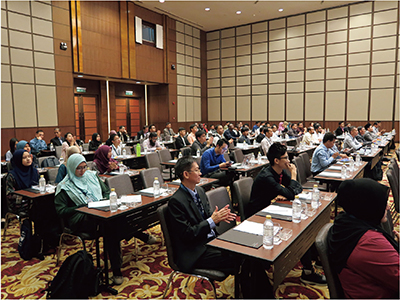
An international conference in the field of electrical and electronic engineering held in Bangkok, Thailand, under “ASEAN University Network/Southeast Asia Engineering Education Development Network (AUN/SEED-Net) Project Phase 4” (Photo: JICA)
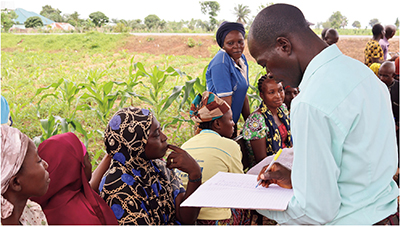
Local company staff collecting data to be used in a proof-of-concept for credit evaluation scoring system to improve access to financial institutions for smallholder farmers in Doma, Nasarawa State, Nigeria (Photo: Zowasel)
In order to achieve quality growth, it is important to develop industrial human resources who will support industrial development. In developing countries where opportunities to receive education and training tend to be limited, Japan supports polytechnic and vocational training schools, that serve as core centers in each country to develop industrial human resources with diverse technologies and skills. In implementing this assistance, Japan utilizes its insight and know-how in cooperation with the private sector. Japan supports the capacity building of teachers and trainers, the reinforcement of the operational capacity of training schools, and the development and revision of curriculums and teaching materials, in order to further strengthen the linkages between education and employment (see “Featured Project” for efforts in Pakistan).
Between 2016 and 2023, Japan, in collaboration with the industrial sector, provided comprehensive assistance including facility and equipment improvement to 19 Technical and Vocational Education and Training (TVET) institutions through 13 projects in nine countries. In 2023, Japan contributed to skill development for women to improve their livelihoods through 13 projects in 20 countries and regions. In the same year, Japan also contributed to the provision of agricultural and entrepreneurship training to 500 people as well as agricultural inputs and startup capital to 500 households in Zambia.
Regarding the Asian region, the Japan-ASEAN Comprehensive Connectivity Initiative was released in September 2023. Japan announced in the Initiative that it would provide capacity building projects for 5,000 individuals over the next three years. Japan will cooperate in developing human resources who will play a key role in ASEAN countries through various projects, such as group and region-focused training and the Project for Human Resource Development Scholarship (JDS).
The “Innovative Asia” Initiative, which has been implemented since FY2017, also provides excellent science and technology students from developing countries in Asia with opportunities to study abroad and intern at companies in Japan to promote the circulation of highly-skilled human resources between Japan and other Asian countries.
The Ministry of Health, Labour and Welfare (MHLW) conducts training both in Japan and in targeted countries of Cambodia, Indonesia, and Viet Nam. The trainingNote 5 is designed to transfer the know-how of Japan’s skills evaluation system accumulated in the government and the private sector (Japan’s National Trade Skill Test and Certification and skills competitions) to those in targeted countries in order to develop and secure a quality workforce. In FY2022, a total of 87 people from three countries participated in these training programs. The training is expected to develop and improve skills evaluation systems in these countries, which in turn will promote the development of their skilled workers and elevate their social standing through increased employment opportunities.
In the African region, Japan supports the development of industrial human resources for the sustainable growth of each individual, through the ABE Initiative (African Business Education Initiative for Youth)Note 6 and the KaizenNote 7 Initiative, which are driven by industry-academia-government collaboration, as well as technical assistance in partnership with international organizations (see Part V, Section 1 (6) and Part V, Section 2 (2) A for the ABE Initiative).
Japan also provides assistance in the area of labor issues. Deterioration in the socio-economic situation usually has the greatest impact on socially vulnerable people, including youth and women. In order to create stable employment, each country needs to prepare for risks by building social safety nets. Moreover, there is a strong international need for support and response to realize decent work for all workers (set out in Goal 8 of the SDGs). Japan provides development cooperation mainly in the Asian region to improve standards of occupational safety and health and social insurance systems, through contributions to the ILO, among others. Japan also contributes to employment support for youth in AfricaNote 8 as efforts to realize decent work.
■ Securing Access to Resources and Energy
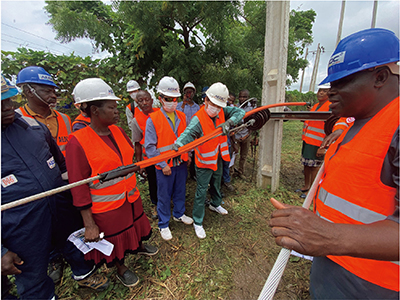
Demonstrating the installation of equipment (protective pipes) provided under the “Project for Capacity Development of Power Distribution” in Nigeria (Photo: SUEZAWA Ruriko)
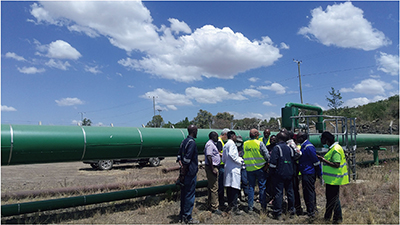
Management training being conducted as part of the “Project for Capacity Strengthening for Geothermal Steam Supply and Management” in Kenya (Photo: JICA)
The number of people without access to electricity is estimated at approximately 675 million in the world as of 2021.Note 9 The lack of electricity, gas, and other energy supplies also leads to many issues, such as delays in industrial development, loss of employment opportunities, and a further increase in the poverty rate. The global energy demand is expected to increase further in Asia and other parts of emerging and developing countries. At the same time, climate action is an urgent task. Under such circumstances, it is important to ensure energy security, while enhancing decarbonization to achieve the goal of net zero emissions by 2050, through diversification of energy suppliers and energy sources.
Japan works on the provision of support that enables modern energy supply and stable supply of electricity for industrial development, in order to promote sustainable development in developing countries. Japan also provides support for the establishment of environmentally friendly infrastructure, such as energy-saving equipment and power generation facilities that utilize renewable energies (hydropower, solar photovoltaics, solar thermal, wind power, geothermal power, etc.) (see Part III, Section 3 (1) for Japan’s efforts to address climate change).
In the Pacific Islands region, located across expansive ocean areas with vulnerability to the impacts of climate change, Japan assists in mainstreaming grid-connected type renewable energy from the perspective of energy security and the realization of low-carbon or decarbonized societies. In the Dominican Republic, which highly relies on imported fossil fuels for its electricity supply, Japan supports LED light use for streetlights on public roads across the country through yen loans in order to help improve the energy efficiency of the country. These efforts are expected to contribute to promoting energy conservation and reducing greenhouse gas emissions in the public sector of the country.
At the Eighth Tokyo International Conference on African Development (TICAD 8),Note 10 held in August 2022, the “Green Growth Initiative with Africa (GGA)” was launched with the aim of maximizing Japan’s cooperation through three concepts, namely ownership and co-creation, flexible finance mobilization, and collaboration with diverse partners. As part of the contribution based on GGA, Japan announced its support for private investment in renewable energy projects, expansion of geothermal power generation, and cooperation in the field of mineral resources such as copper and rare metals that are indispensable for realizing a decarbonized society. As support for African countries to appropriately preserve and utilize natural resources and ecosystems, and to realize sustainable growth (green growth), Japan helps in the operation and maintenance of the Africa Power Pool (interconnected power grid among several countries), power distribution networks, and grid stabilization, among other efforts.
In Kenya, through the assistance to develop the Olkaria Geothermal Power Plants, Japan contributes to increasing and stabilizing power supply, and Japanese companies are responsible for part of the project implementation. In 2022, the ceremony for the official commissioning of the Olkaria I Additional Unit 6 and V Geothermal Power Plant was held. With the inauguration of the plants, Kenya has become sixth in the world in terms of installed capacity of geothermal power.
■ Initiatives toward Food Security and Nutrition
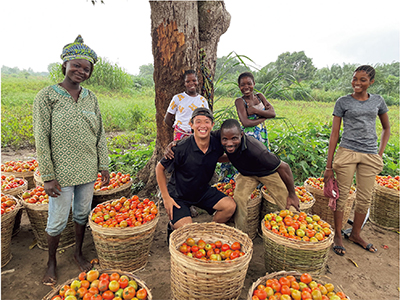
A JOCV engaging in cooperation activities in Benin, communicating daily with smallholder farmers in the local community to help them increase their income (Photo: JICA)
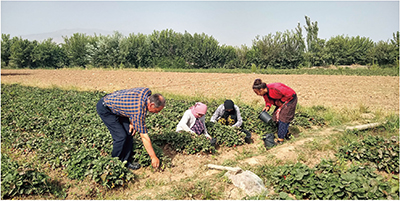
Smallholder farmers in Tursunzoda, Tajikistan, produce and harvest strawberries as a marketable crop to increase their income as part of the Smallholder Horticulture Empowerment & Promotion (SHEP) project (Photo: JICA)
According to the report of “the State of Food Security and Nutrition in the World 2023,”Note 11 between 691 and 783 million people were estimated to be in hunger in 2022. This number increased by approximately 122 million compared to 2019, before the global spread of COVID-19. The report also predicts that approximately 600 million people will still face hunger in 2030. The report also states that “We have no option but to redouble our efforts to transform agrifood systems and leverage them towards reaching the Sustainable Development Goal 2 (SDG 2) ‘Good Health and Well-Being’ targets,” recommending that overcoming the challenges will require policy interventions, actions, and investments.
Japan provides food assistanceNote 12 based on requests from developing countries facing food shortages. In FY2023, Japan contributed a total of 6.15 billion yen to 21 countries/regions as a grant mainly with the provision of Japan’s Government-Owned Rice.
In addition to bilateral support, Japan is engaged in efforts to provide food assistance in cooperation with international organizations. For example, through the World Food Programme (WFP), Japan supports school meal programs to improve access to education, as well as initiatives to encourage people to participate in the development of agricultural land and social infrastructure through the distribution of food. In August 2023, Japan decided to provide grant aid of 300 million yen through WFP to Guinea, which has been affected by Russia’s aggression against Ukraine and had experienced food supply strains and sharp price increases, to provide Japan’s Government-Owned Rice. In 2022, WFP conducted activities including the distribution of approximately 4.8 million tons of food, and food assistance based on cash transfers to approximately 160 million people in more than 120 countries and regions around the world. Japan contributed a total of approximately 265.12 million US dollars to the WFP projects in 2022.
Japan supports the improvement of nutrition in developing countries through contributions to the multilateral development banks (MDBs).Glossary In 2021, Japan announced additional contributions totaling 70 million US dollars to the World Bank’s Global Financing Facility (GFF)Glossary and the Japan Trust Fund for Scaling Up Nutrition.Glossary From the perspective of mainstreaming nutrition in development policy, Japan hosted the 20th replenishment final meeting of the International Development Association (IDA) of the World Bank Group in December 2021, and included in its agenda the strengthening of human capital, including improving nutrition status, as a priority area. In December 2021, Japan hosted the “Tokyo Nutrition for Growth Summit 2021,” during which Prime Minister Kishida announced more than 300 billion yen in nutrition-related financial contributions over three years. In 2022, Japan contributed 160.682 billion yen (provisional).
In order to achieve food security and improved nutrition, Japan is proactively addressing food issues as a global challenge emphasizing cooperation for the promotion of agriculture, forestry, and fisheries, including the establishment of food value chains,Glossary in addition to food assistance.
In developing countries, low purchase prices for agricultural products are one of the factors that prevent many farmers from escaping poverty. Japan promotes the establishment of food value chains for developing countries in cooperation with private companies, such as by formulating the “Plan to Promote the Establishment of Global Food Value Chain,” which defines priority initiatives to establish a food value chain in each country and region. In 2023, Japan organized bilateral policy dialogues with Thailand.
Japan places emphasis on agriculture as an essential industry that plays an important role in Africa’s economic growth, and actively contributes to its development. Specifically, under the Coalition for African Rice Development (CARD)Glossary Phase 2, Japan proceeds with efforts to improve the quantity and quality of rice production applying the RICE approach.Glossary The approach includes support for the development of irrigation facilities, research on superior rice varieties including New Rice for Africa (NERICA),Glossary a hybrid of Asian and African rice varieties, and dissemination of production technology. CARD targets have expanded to 32 countries.
In TICAD 8 held in August 2022, Japan set the goal to provide human resources development for 150,000 people and to realize a doubling of rice production (56 million tons) by 2030 through CARD.
In order to transform agriculture from self-sufficient to “income generating” activities, Japan provides assistance through the Smallholder Horticulture Empowerment Promotion (SHEP) approach.Glossary The SHEP approach refers to an effort to assist smallholder farmers producing fruits and vegetables, aimed at increasing their income by causing a mindset shift to “growing to sell” and through improvements to farm management and cultivation skills. Japan has so far provided training and dispatched experts to 29 countries in Africa to support the transformation from the existing subsistence agricultural model. Japan expressed at TICAD 8 that it would support 66,000 people’s shift to agriculture for “earning” through the SHEP approach. Japan also stated that it would provide 300 million US dollars through co-financing to support the strengthening of food production in coordination with the African Development Bank’s African Emergency Food Production Facility.
In order to contribute to the improvement of food security through the enhancement of transparency in international agricultural markets, Japan has supported the “Agricultural Market Information System (AMIS)”Note 13 through providing data and financial resources. At the G7 Hiroshima Summit in May 2023, it was confirmed that the efforts for AMIS would be strengthened.
Japan provides assistance in the agricultural sector through international organizations such as FAO, IFAD, the Consultative Group on International Agricultural Research (CGIAR), and WFP in order to strengthen developing countries’ own foundations for food production. For example, Japan, in partnership with FAO, provides assistance in technical cooperation for the agricultural and rural development of developing countries, the establishment of international standards and norms in the food and agriculture fields, and the development of statistics. Japan also supports research and development aimed at both increasing productivity and sustainability, including variety development, the introduction of digital agricultural technologies, and other efforts conducted by CGIAR, which is comprised of 15 international agricultural research institutions. In March 2023, Japan decided to provide food-related assistance totaling 50 million US dollars to Asia, the Middle East, and Africa as a response to the deterioration of global food security, which has been exacerbated by Russia’s aggression against Ukraine. Additionally, in April 2023, Japan launched the “Enhanced Linkages between Private Sector and Small-scale Producers (ELPS)” initiative to promote developed countries’ support for development of sustainable and resilient food systems in developing countries. This initiative was also welcomed by the G7 countries at the G7 Agriculture Ministers’ Meeting in Miyazaki.
In addition to the above-mentioned assistance in the agricultural sector, Japan contributes to improving animal health through the World Organisation for Animal Health (WOAH) and FAO. For example, Japan participates in the “Global Framework for the Progressive Control of Transboundary Animal Diseases (GF-TADs),” established by WOAH and FAO in response to transboundary animal diseases such as Avian Influenza, Foot-and-Mouth Disease (FMD), and African Swine Fever (ASF), supporting the initiatives of international organizations in the field of animal health mainly for the Asia-Pacific region.
Glossary
- Quality growth
- Growth that is “inclusive” in that the fruits of growth are shared across society as a whole, leaving no one behind, “sustainable” in that the economy, society, and environment are in harmony for generations, and “resilient” in that it is able to withstand and recover from various shocks, including natural disasters and economic crises (Development Cooperation Charter).
- Least Developed Countries (LDCs)
- According to the classification by the UN, LDCs are countries particularly behind in development compared to other developing countries based on their income levels. LDCs meet certain criteria, including gross national income (GNI) per capita of 1,018 US dollars or less on average between 2017 and 2019. As of 2022, there are 46 eligible countries: 9 in Asia, 33 in Africa, 1 in Latin America and the Caribbean, and 3 in Oceania.
- Duty-free, quota-free access
- A measure to make products imported from LDCs tariff free and without any import quotas. Japan has been expanding the number of applicable products under this measure, and approximately 98% of all products can be imported under such conditions.
- Economic Partnership Agreement (EPA)
- EPAs are agreements for strengthening a wide range of economic relations, incorporating not only elements of Free Trade Agreements (FTAs) that are aimed at reducing and eliminating tariffs on goods and barriers to trade in services between specific countries and regions, but also elements of cooperation in various sectors such as investment, movement of persons, protection of intellectual property, and rulemaking on competition policy. These agreements are expected to further vitalize trade and investment between countries and accelerate economic growth.
- Aid for Trade (AfT)
- AfT is an assistance provided to developing countries to improve trade-related capabilities and to develop infrastructure for the purpose of achieving economic growth and poverty reduction through trade in developing countries under the WTO’s multilateral trading system. The WTO emphasizes the significance of promoting the development of developing countries through their participation in the multilateral free trading system.
- One Village, One Product Campaign
- The One Village, One Product Campaign is a globally prevailing initiative launched in Oita Prefecture, Japan in 1979. The initiative aims to create jobs and to revitalize local communities through promoting unique products that take advantage of local resources and traditional techniques. In Asia and Africa, this Campaign facilitates expanding exports of developing countries’ products by discovering attractive goods, such as handcrafts, textiles, and toys that represent the unique ethnic characteristics of those countries and by reaching out to a wider range of people.
- 2030 Agenda for Sustainable Development (2030 Agenda)/Sustainable Development Goals (SDGs)
- International goals aimed at a sustainable and better world by 2030, as described in “the 2030 Agenda for Sustainable Development” adopted by all UN member states at the UN Summit in September 2015 as the successor to the Millennium Development Goals (MDGs, 2001). The SDGs consist of 17 goals and 169 targets.
- OECD/G20 BEPS Project
- Base Erosion and Profit Shifting (BEPS) refers to the problem where multinational enterprises exploit gaps and loopholes in international tax systems, including tax treaties, and undertake excessive tax planning measures to intentionally reduce their tax burden in spite of their taxable economic activities. In order to address this problem, the BEPS Project was launched in June 2012 by the OECD’s Committee on Fiscal Affairs, with the aim of ensuring fair competition, bringing international taxation rules in line with the realities of the global economy and enterprise behavior, and reviewing international taxation rules as a whole in order to strengthen transparency of governments and multinational enterprises.
- Multilateral Development Banks (MDBs)
- A general term for international organizations that provide comprehensive support for poverty reduction and sustainable economic and social development in developing countries through financial assistance, technical assistance, and intellectual contributions. The term MDBs generally refers to the World Bank Group, which provides assistance worldwide, and four regional development financial institutions that provide support to their respective regions, namely, the Asian Development Bank (ADB), the Inter-American Development Bank (IDB), the African Development Bank (AfDB), and the European Bank for Reconstruction and Development (EBRD).
- Global Financing Facility (GFF)
- An initiative launched in 2015 by the World Bank, the UN, and others to expand financial resources for the maternal and child health field. The GFF provides technical assistance for the formulation of maternal and child health policies, including those to improve the nutritional status of women and children, and for the enhancement of implementation capacity. The GFF aims to mobilize funds effectively by providing support to formulate plans with the pre-condition that low-interest loans from the World Bank and other sources are used to implement said plans.
- Japan Trust Fund for Scaling Up Nutrition
- A trust fund established in 2009 to scale up nutrition investments in high undernutrition-burden countries and to strengthen in-country capacity to implement nutrition programs. It provides technical assistance to high undernutrition-burden countries to formulate policies for improving nutrition and to improve their implementation capabilities, thereby boosting nutrition investments by the countries concerned and the World Bank.
- Establishment of Food Value Chain
- An activity in which various stakeholders cooperate, including the farmers, suppliers of farming materials and implements, such as seeds, fertilizers, and farming machinery, processing companies of agricultural produce, transportation and distribution companies, and retailers, aiming at creating a chain that can enhance the added value of agricultural products from the stages of production, to manufacturing and processing, distribution, and consumption. For example, it includes improving the quality of agricultural produce, developing attractive new products, reducing transportation costs, increasing sales opportunities by expanding the sales network, and other activities.
- Coalition for African Rice Development (CARD)
- An initiative to support self-help efforts to expand rice production in Africa, as well as a donor advisory group to work in partnership with interested rice-producing countries. It was launched by Japan in collaboration with an international NGO, Alliance for a Green Revolution in Africa (AGRA), at TICAD IV in 2008, and Japan also launched the CARD Phase 2 at TICAD 7 in 2019.
- Resilience, Industrialization, Competitiveness, Empowerment (RICE) approach
- An initiative adopted under CARD Phase 2 to realize the goal of doubling rice production in Sub-Saharan Africa. Specific efforts include stabilizing production through adaption to climate change and population growth, industrial formation in local areas in cooperation with the private sector, enhancing the quality of home-grown rice so that it can compete with imported rice, and establishing agricultural management systems to improve the household incomes and livelihoods of farmers.
- New Rice for Africa (NERICA)
- A general term for rice developed by the CGIAR Africa Rice Center through the hybridization of high-yield Asian rice with weed, disease, and insect pest resistant African rice. Compared to conventional rice, NERICA are characterized by (1) a higher yield, (2) a shorter growing period, which means that they can grow in the short rainy season and avoid the risk of drought, (3) higher resistance to dryness (drought) and disease, and can withstand the hot, dry climate unique to Africa. Since 1996, Japan has been supporting the development and dissemination of varieties of NERICA by dispatching researchers and experts from the Japan International Research Center for Agricultural Sciences (JIRCAS) and JICA.
- Smallholder Horticulture Empowerment & Promotion (SHEP) approach
- An approach started by Japan in Kenya in 2006 to assist smallholder farmers producing fruits, vegetables, and other produce. It aims to increase their income through converting farmers’ mindset from “grow and sell” to “grow to sell” and by improving farm management and cultivation skills. Japan promotes the activities integrating the SHEP approach around the world with a focus on Africa.
- Note 1: This refers to the entire process, from procuring raw materials to production, processing, distribution, and sales to providing the product to consumers.
- Note 2: See the glossary “Establishment of Food Value Chain.”
- Note 3: The six countries are: Cambodia, Laos, Malaysia, Myanmar, the Philippines, and Thailand.
- Note 4: Pillar One is a revision of international taxation principles to allow the taxation of multinational enterprises with large scale and high profit levels in market countries regardless of their physical presence. Pillar Two is the introduction of a global minimum tax from the perspective of limiting the possibility of a race to the bottom on corporate income tax rates.
- Note 5: The types of training include “Training for people in charge of writing test standards and test questions, etc.,” and “Training for people in charge of testing and grading, etc.” The number of participants above is the total for all types of training.
- Note 6: See the glossary.
- Note 7: An approach in which each worker at a production site comes up with and implements their own ideas on how to eliminate inefficiency in the production process and improve quality and productivity. In Japan, in the period of rapid growth after WWII, this approach was cultivated on the job by the manufacturing industry to increase quality and productivity, and is based on 5S: “Sort, Set, Shine, Standardize, and Sustain.”
- Note 8: Ethiopia, Gambia, Madagascar, Mauritania, Mozambique, and Sudan.
- Note 9: IEA “Tracking SDG7: The Energy Progress Report, 2023” https://www.iea.org/reports/tracking-sdg7-the-energy-progress-report-2023
- Note 10: See the glossary “Tokyo International Conference on African Development (TICAD).”
- Note 11: A report jointly prepared and published by FAO, IFAD, UNICEF, WFP, and WHO. https://www.wfp.org/publications/state-food-security-and-nutrition-world-sofi-report-2023
- Note 12: Grant aid that provides funds for the procurement of necessary products and services to developing countries making efforts for socio-economic development, including poverty reduction, in order to implement food aid provided in accordance with the Food Assistance Convention.
- Note 13: A system launched in 2011 by the G20 as a measure to counter the wild fluctuations of food prices. Various countries, corporations, and international organizations utilize the system to share information on the agricultural and food market (such as production volumes and prices) in a timely, accurate, and transparent manner.
